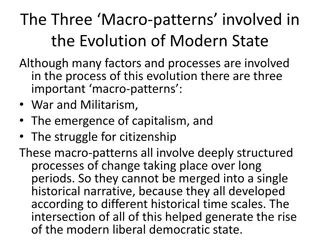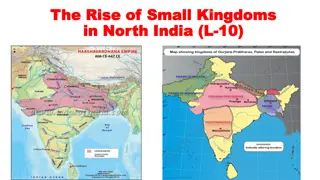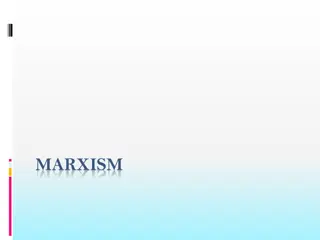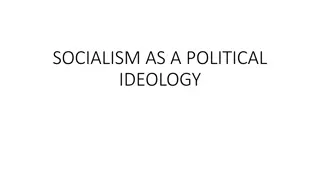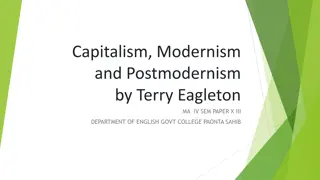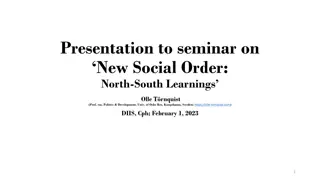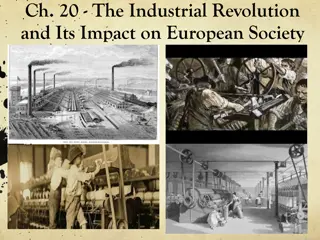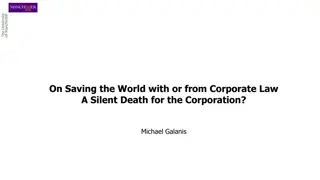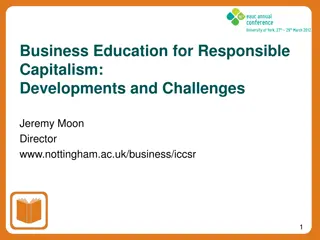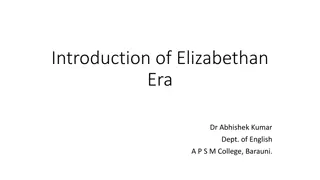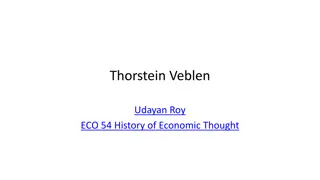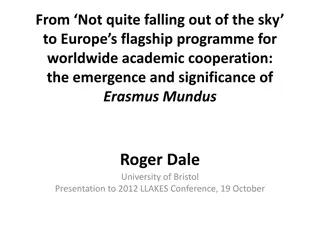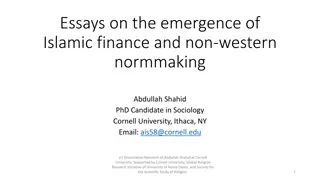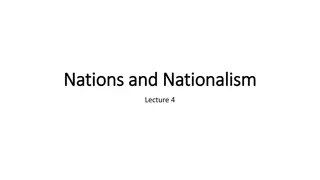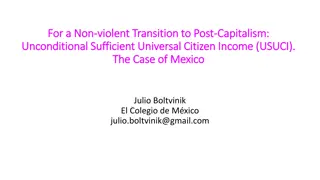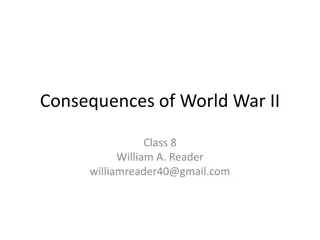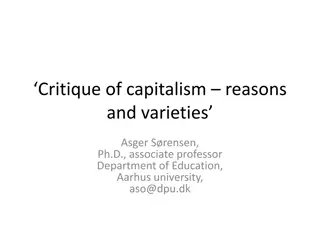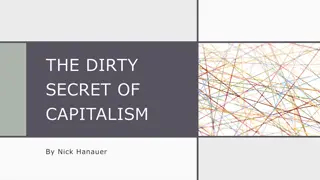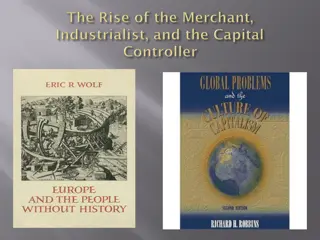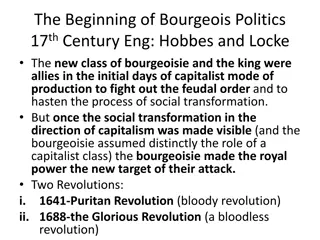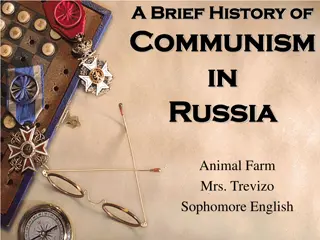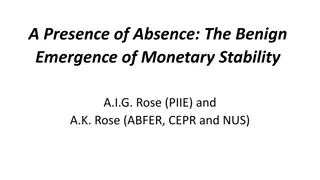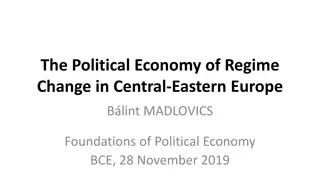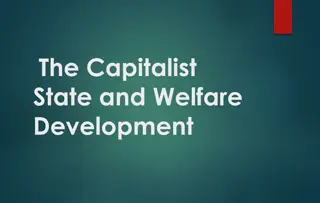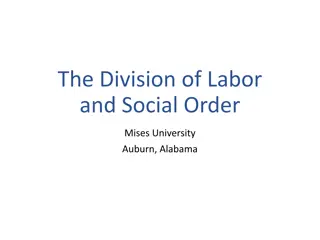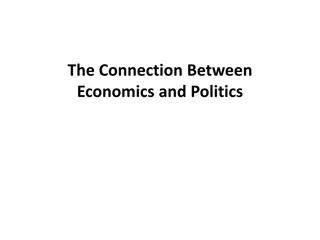Evolution of Modern State: Three Macro-Patterns Explored
The evolution of the modern state is influenced by three key macro-patterns: War and Militarism, Emergence of Capitalism, and Struggle for Citizenship. These patterns involve deep processes of change over long periods, contributing to the development of modern liberal democratic states. War and Mili
0 views • 13 slides
Debate Framework for Capitalism vs. Communism
This debate framework presents a structured approach for arguing in favor of or against the motion that capitalism is superior to communism. It includes sections such as introduction, statement of the motion, definitions, and criteria or principles to guide the debate. Emphasis is placed on developi
0 views • 9 slides
Insights Into 'An Inspector Calls' Characters
In "An Inspector Calls," the Inspector represents socialism, with an air of solidity and omniscience. He delivers a warning about mankind needing to change and accept responsibility. Mr. Birling, on the other hand, embodies capitalism, shown as unlikeable and out of touch. The play critiques Birling
0 views • 7 slides
Theories of International Relations Overview
The field of International Relations (IR) encompasses various theories that seek to explain global phenomena, drawing from disciplines like history, philosophy, and economics. Theory, derived from contemplation and speculation, organizes ideas to explain issues such as state emergence, conflict caus
1 views • 47 slides
Emergence of Small Kingdoms in North India During 8th to 10th Century
The rise of small kingdoms in North India between 750 CE to 1000 CE was a result of the disintegration of empires, economic struggles, and weak administration. This period saw the emergence of powerful kingdoms like the Rastrakutas, Palas, and Pratiharas in different regions of India, each contribut
0 views • 28 slides
Understanding Marxism and Capitalism
Marxism is a body of social, political, and economic thought derived from the works of Karl Marx and Friedrich Engels, focusing on the analysis of capitalism. Capitalism is an economic system where private individuals own goods and services based on market supply and demand. The purest form of capit
0 views • 25 slides
Understanding Socialism: A Comprehensive Overview
Socialism is a political and economic ideology that advocates for collective or state ownership of production, distribution, and exchange. It emerged in the early 19th century as a response to industrial capitalism, aiming for a more egalitarian society that prioritizes collective well-being. Social
0 views • 9 slides
Understanding Capitalism, Modernism, and Postmodernism in Literature
Terry Eagleton's essay delves into the impact of capitalism on art and literature, exploring the emergence of modern and postmodern literature in the capitalist and late capitalist eras. He discusses how late capitalism influences art with characteristics like mass consumerism and virtual reality. P
1 views • 7 slides
Social Democratic Politics: Pillars and Strategies for Transformation
Social democratic politics is rooted in democratic collectivities and rights, aiming to reshape capitalism through reform, regulation, and transformative strategies. Olle Törnquist delves into the historical foundations and the need for comprehensive reforms to challenge the dominant logics of capi
3 views • 10 slides
The Impact of the Industrial Revolution on European Society
The Industrial Revolution marked a significant period in European history, beginning in the 18th century and ushering in profound changes. Industrialization brought about advancements in agriculture, the growth of capitalism, and the rise of trade unions. This era also saw the emergence of new iron
4 views • 27 slides
The Role of Corporate Law in Wealth Distribution and Capitalism
Exploring the evolution of corporations within capitalist frameworks, this analysis delves into the intertwined concepts of managerialism, infinite wealth accumulation, and the social-historical embeddedness of corporations. Through historical contexts and theoretical perspectives, the discussion de
0 views • 17 slides
Evolving Trends in Business Education for Responsible Capitalism
Explore the developments and challenges in business education for responsible capitalism, focusing on the role of business schools, a decade of progress in programs and research, and analysis of UN PRME signatory reports. Discover how sustainability-related research and learning offerings are shapin
0 views • 25 slides
Exploring the Moral Foundations of Capitalism
Delve into the historical origins and ethical principles underpinning capitalism as seen through iconic quotes, foundational texts, and philosophical analysis. Understand the intertwined concepts of liberty, economics, philosophy, and ethics that shape capitalist ideology and practices, emphasizing
0 views • 42 slides
Shadow Education and Educational Capitalism in Cambodia
Exploring the impact of shadow education on the nation-state in Cambodia, this analysis delves into the complex interplay between educational development, compulsory schooling, privatization practices, and the emergence of educational capitalism. It questions the traditional notions of nation-state
0 views • 8 slides
Queer Art Beyond Identity Politics: Exploring Capitalism, Gentrification, and LGBT+ Inequalities
Explore the complex intersections of capitalism, gentrification, and LGBT+ identities through the lens of queer art and community activism. Unpack the nuances of human capital theory, dominance of middle-class white gay men, and challenges faced by people of color within the LGBT+ community. Contemp
0 views • 13 slides
Insight into the Elizabethan Era: Queen Elizabeth's Reign
The Elizabethan Era under Queen Elizabeth's reign marked a transformative period in England, characterized by a shift from darkness to light in various aspects of English life. Queen Elizabeth's dedication to England and her inspiring patriotism brought about unity and national greatness, amidst rel
0 views • 9 slides
Insights on Black Hole Interiors and Emergence of Geometry in Quantum Mechanics
Various perspectives on black hole interiors are discussed, including the controversial debate on information loss, emergence of interior geometry, and challenges related to quantum computations. The emergence of interior structure is explored through toy models and considerations of locality in str
0 views • 26 slides
Strawson's Thin Subjects in Consciousness: Exploring Emergence and Alternatives
Exploring the concept of Strawson's Thin Subjects in consciousness through the lens of emergence and alternative theories such as Panpsychism, Neutral Monism, and Dual-aspect Theory. Delve into the debate on whether experience is always accompanied by a subject of experience and the challenges posed
0 views • 16 slides
Thorstein Veblen: Critic of Capitalism and Founder of American Institutionalism
Thorstein Veblen, a key figure in the history of economic thought, criticized capitalism for its rough and monopolistic nature. He founded the American Institutionalism School and challenged neoclassical economics' view of rational consumer behavior and business motivations. Veblen's analysis focuse
0 views • 23 slides
Emergence and Significance of Erasmus Mundus: An Overview
Explore the emergence of Erasmus Mundus, a flagship academic cooperation program in Europe, aimed at enhancing the quality of higher education, promoting mobility, and fostering intercultural understanding. Learn about its aims, structure, and impact on European higher education within a global cont
0 views • 13 slides
Emergence of Islamic Finance: Dynamics and Hypotheses
Exploring the emergence of Islamic finance and non-western norm-making through the research of Abdullah Shahid, a PhD candidate at Cornell University. The study delves into the dynamics of Islamic development financing, the context of the Islamic Development Bank, and various hypotheses related to f
0 views • 17 slides
Emergence of Phonotactic Complexity in Early Phonological Development
Barbara L. Davis, Ph.D., from The University of Texas at Austin, presents research on phonotactic complexity in early phonological development using the Texas Speech Production (TSP) database. The study examines the emergence of phonotactic properties in speech acquisition among typically developing
0 views • 39 slides
Understanding Nations, Nationalism, and Their Emergence: A Comprehensive Overview
Explore the concept of nationhood, the evolution of nationalism, and the intricate relationship between cultural and political identities. Delve into the emergence of nations, the definition of a nation, and the complexities of cultural nations. Uncover historical examples, such as the Polish-Lithua
0 views • 15 slides
Transition to Post-Capitalism: Unconditional Citizen Income in Mexico
Unstoppable technology advancements in capitalism lead to the replacement of human labor, creating an insufficient wage-labor income link. The concept of an Objective Limit of Capitalism (OLC) suggests that the need to exploit human labor will diminish as science progresses, highlighting the necessi
0 views • 7 slides
The Impact of World War II on Japan and the Emergence of the Cold War
World War II had far-reaching consequences on Japan, leading to significant naval battles, intense fighting in Okinawa, and ultimately, the country's surrender following the atomic bombings of Hiroshima and Nagasaki. The post-war period saw the emergence of the Cold War as tensions rose between the
0 views • 63 slides
Critique of Capitalism: Reasons and Varieties by Asger Sørensen, Ph.D.
Asger Sørensen, Ph.D., delves into the critique of capitalism, exploring various perspectives such as political contestation, economic analysis, and value assessment. Through historical contexts and theoretical frameworks, Sørensen raises fundamental questions about capitalism's impact on freedom,
0 views • 10 slides
Comparative Study of Sprinkler Irrigation vs. Furrow Irrigation for Sugar Beet Production in Imperial Valley, California
This research project in the Imperial Valley, California, compares the effectiveness of sprinkler irrigation and furrow irrigation on sugar beet emergence and yield during the production season. Through field surveys and data analysis, the study aims to determine the impact of irrigation methods on
0 views • 25 slides
Unveiling the Dirty Secrets of Capitalism by Nick Hanauer
Nick Hanauer, a successful capitalist, sheds light on the flaws of capitalism and neoliberal economic theory, emphasizing the need for regulatory changes to benefit the majority. He challenges the assumptions of market capitalism and advocates for a new economic approach focused on cooperation and s
0 views • 25 slides
The Emergence of Capitalism and Global Trade Dynamics
European expansion from the 15th century onwards saw the rise of a commercial network on a global scale, driven by a blend of economic interests and political power. The capitalist system evolved through strategic trade, market expansions, and a regional division of labor. The movement of goods and
0 views • 58 slides
The Evolution of Bourgeois Politics in 17th Century England: Insights from Hobbes and Locke
The emergence of bourgeois politics in 17th century England marked a significant shift in power dynamics as capitalism began to take hold. The bourgeoisie initially allied with the monarchy to overthrow the feudal order but later turned against the royal power. The Puritan Revolution and the Gloriou
0 views • 20 slides
Exploring Tool.Box.Living.Lab: A Collaborative Innovation Platform
The Tool Box Living Lab (TBLL) is an open innovation research method that fosters collaboration among diverse profiles to generate ideas and solutions. It focuses on co-creation with end users and stakeholders in a real-life setting, promoting the emergence of common views, innovations, and collabor
0 views • 15 slides
Exploring Surveillance Capitalism and Academic Skills
Delve into the world of surveillance capitalism, academic skills, and the importance of maintaining an academic tone in speaking and writing. Explore self-assessment tools, including assessments on online privacy and security. Learn from experts like Mark Weinstein about social media, privacy advoca
0 views • 20 slides
A Brief History of Communism: From Capitalism to Karl Marx's Vision
The history of communism traces back to the capitalist system's exploitation of workers in the mid-1800s. Karl Marx's vision, outlined in "The Manifesto of the Communist Party," aimed for economic equality and worldwide revolution. The inherent flaws of capitalism were critiqued, leading to the rise
0 views • 17 slides
The Emergence of Monetary Stability in a Changing Economic Landscape
Amidst global economic shifts, A.I.G. Rose and A.K. Rose explore the emergence of monetary stability in their publication "A Presence of Absence." They delve into the rise of effective monetary policies, the impact of inflation targeting, and the evolution of stable monetary regimes. Through insight
0 views • 36 slides
The Political Economy of Regime Change in Central-Eastern Europe
The content discusses the concepts of socialism and capitalism, exploring various models and transitions from socialism to capitalism. It focuses on regime changes in Central and Eastern Europe, with case studies on Poland and Hungary. The text covers different varieties of socialism and their econo
0 views • 21 slides
Evolution of Capitalism and Welfare Development
Earnest Mandel identified three types of capitalism - industrial, entrepreneurial, and corporate - each influencing welfare development differently. Industrial capitalism lacked state welfare, while entrepreneurial capitalism introduced social security measures. Corporate capitalism necessitated sta
0 views • 10 slides
Understanding the Emergence of Genres in Media: A Study of Innovation and Evolution
The emergence of genres in media is a fascinating process that involves the development of new types of content within both traditional and digital platforms. From the rapid rise of blogging to the evolution of genres in personal media like selfies, researchers explore how innovation and technology
0 views • 18 slides
The Division of Labor and Social Order in Capitalism
In capitalism, conflict is viewed as an essential component of social relations, leading to increased productivity and unity among individuals. The division of labor promotes specialization and efficiency in production, ultimately benefiting society as a whole. Comparative advantages and opportunity
0 views • 16 slides
The Interplay of Economics and Politics: A Comprehensive Analysis
Explore the intricate relationship between economics and politics, delving into the evolution of capitalism, the necessity of private property rights, challenges in establishing capitalism in certain countries, and the complex dynamics between capitalism and democracy. The discussion highlights the
0 views • 9 slides
Exploring the Complex Relationship Between Football and Capitalism
The relationship between football and capitalism is analyzed through contrasting viewpoints, with one side viewing football as a tool for distracting the populace and compensating for societal injustices, while the other sees it as a form of art and human expression. The discussion delves into the s
0 views • 26 slides
